पाठ 10 - Simple Past
बात चिट
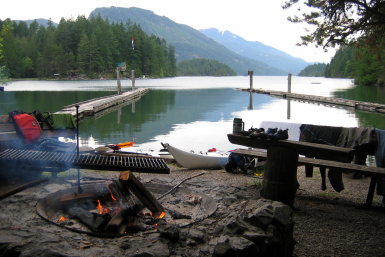
English
Eric phones Tom to tell him about his vacation at a nearby lake.
Eric: Hi Tom. How's it going?
Tom: Good. How was your vacation?
Eric: Great! We went hiking in the forest, and kayaking around the lake. We were very lucky with the weather, it was sunny and warm every day.
Tom: How many people were there?
Eric: There were five of us.
Tom: Where did you stay?
Eric: We rented a cabin at the south end of the lake. It was right on the lake, with a small beach in front. It came with a kayak and wood for the fire pit on the beach. I had such a great time that I want to go again next summer. Maybe you can come with us next time.
Tom: That sounds great!
शब्दावली और वाक्यांश
 How many people were there?
How many people were there?
|
कितने लोग थे |
 at a nearby lake
at a nearby lake
|
पास के झील पर |
 We went hiking in the forest, and kayaking around the lake.
We went hiking in the forest, and kayaking around the lake.
|
हम जंगल में लंबी पैदल यात्रा कर रहे थे, और झील के चारों ओर कायाकिंग |
 beach
beach
|
समुद्र तट |
 cabin
cabin
|
केबिन |
 to phone
to phone
|
फोन करने के लिए |
 to tell
to tell
|
बताना |
 fire pit
fire pit
|
अग्निकुंड |
 kayak
kayak
|
कश्ती |
 lucky
lucky
|
भाग्यशाली |
 to rent
to rent
|
पट्टे पर देना |
 to come with
to come with
|
के साथ आने के लिए |
 south
south
|
दक्षिण |
 to stay
to stay
|
बने रहने के लिए |
 vacation
vacation
|
छुट्टी |
 wood
wood
|
लकड़ी |
विज्ञापन
Weather
 weather
weather
|
मौसम |
 cloud
cloud
|
बादल |
 heat
heat
|
तपिश, गर्मी |
 rain
rain
|
वर्षा, बारिश |
 snow
snow
|
हिमपात |
 storm
storm
|
आंधी |
 sun
sun
|
रवि |
 wind
wind
|
हवा, वायु |
 How's the weather?
How's the weather?
|
मौसम कैसा है? |
 It's a beautiful day.
It's a beautiful day.
|
यह एक खूबसूरत दिन है। |
 It's cold.
It's cold.
|
ठंडा है। |
 It's cool outside.
It's cool outside.
|
यह बाहर ठंडा है। |
 It's foggy.
It's foggy.
|
यहां कोहरा है। |
 It's hot.
It's hot.
|
यह गरम है। |
 It's humid.
It's humid.
|
वातावरण में नमी है। |
 It's raining.
It's raining.
|
बारिश हो रही है। |
 It's snowing.
It's snowing.
|
आज बर्फ़ गिर रही है। |
 It's stormy.
It's stormy.
|
यह तूफानी है। |
 It's sunny.
It's sunny.
|
धूप निकली हुई है। |
 It's windy.
It's windy.
|
हवा चल रही है। |
 It's very windy today.
It's very windy today.
|
आज बहुत हवा है। |
 The weather's bad.
The weather's bad.
|
मौसम का बुरा हाल। |
 The weather's nice.
The weather's nice.
|
मौसम अच्छा है। |
 It's supposed to be nice tomorrow.
It's supposed to be nice tomorrow.
|
कल अच्छा मौसम होना चाहिए। |
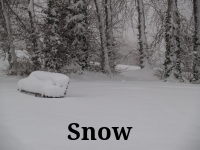
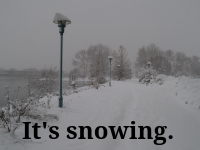
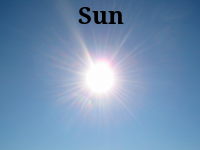

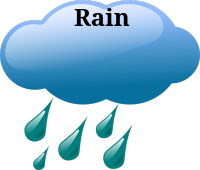
व्याकरण
Past Tense of Verbs
The past tense of verbs, also called the simple past tense, describes a past action, event, or emotional state. Most verbs form the past tense by adding the suffix ed to the end of a verb. For example the past tense of walk is walked.
उदाहरण
| I walked to the park yesterday. | मैं कल पार्क में चला गया। |
| She talked about her vacation. | उसने अपनी छुट्टी के बारे में बात की। |
| He closed the door. | उसने दरवाजा बंद कर दिया। |
| They talked about the cabin. | उन्होंने केबिन के बारे में बात की। |
| We hoped for the best. | हम सबसे अच्छा के लिए आशा व्यक्त की । |
| The clouds drifted away. | बादल दूर तैरते रहे। |
Irregular Verbs in the Past Tense
Many very common verbs in English have an irregular past tense. This lesson will cover a few of these very common irregular verbs. The next lesson will cover some more irregular verbs as well.
To Be
The verb be is the most irregular verb in English. It has two forms in the past tense. The following table shows the past tense for the verb be.
| I was | |
| he was | |
| she was | |
| it was | |
| we were | |
| you were | |
| they were |
उदाहरण
| I was at the store. | मैं दुकान पर था। |
| He was tired. | वह थका हुआ था। |
| They were happy. | वे खुश थे। |
| We were at home. | हम घर पर थे। |
| Were they at the beach? | क्या वे समुद्र तट पर थे? |
| They were not at the beach. | वे समुद्र तट पर नहीं थे। |
| The car was dirty. | कार गंदा थी। |
| The windows were dirty. | खिड़कियां गंदे थीं। |
Other Irregular Verbs
The following table shows some very common verbs that are irregular in the past tense. Lesson 11 will cover even more irregular verbs.
| Verb | Past Tense | |
|---|---|---|
| do | did | करना |
| have | had | स्वामी होना, कब्जा करने के लिए |
| go | went | जाना |
| sleep | slept | सोने के लिए |
| come | came | आना |
| give | gave | देना |
| find | found | ढूंढना |
| think | thought | सोचना |
उदाहरण
| They went to the store last week. | वे पिछले हफ्ते स्टोर गए थे। |
| He thought about it. | उसने इसके बारे में सोचा। |
| I slept all night. | मैं पूरी रात सो गया। |
| We did the work. | हमने काम पूरा किया। |
| They found it. | उन्होंने इसे पाया। |
| She found the book. | उसने किताब को पाया।। |
| I did the dishes. | मैंने व्यंजनों को किया। |
| They slept on the floor. | वे फर्श पर सो गए। |
Questions and Negative Statements with the Past Tense
For both questions and negative statements, the past tense of the helper verb do is used along with the main verb, similar to how do is used as a helper verb when asking questions or making negative statements in the present tense.
Note: Did not is often shortened to didn't.
उदाहरण
| Did they go to the store? | क्या वे दुकान में गए थे? |
| They did not go to the store. | वे दुकान पर नहीं गए। |
| They didn't go to the store. | वे दुकान पर नहीं गए। |
| Did you sleep all night? | क्या तुमने सारी रात सोया? |
| I did not sleep all night. | मैंने सारी रात सो नहीं की। |
| Did she find the book? | क्या उसने किताब को पाया? |
| She did not find the book. | उसे किताब नहीं मिली। |
| Did you buy it? | क्या आपने इसे खरीदा? |
| We did not buy it. | हमने इसे नहीं खरीदा। |
| They did not do it. | उन्होंने ऐसा नहीं किया। |
A very small number of verbs, such as be, do not use a helper verb when asking a question or making a negative statement. The following examples show how to ask questions and make negative statements with the verb be.
| Were you tired? | क्या तुम थक गए थे? |
| I was not tired. | मैं थक नहीं रहा था। |
| I wasn't tired. | मैं थक नहीं रहा था। |
| Was the house for sale? | क्या वह घर बिक्री के लिए था? |
| The house was not for sale. | घर बिक्री के लिए नहीं था। |
| The house wasn't for sale. | घर बिक्री के लिए नहीं था। |
| Were the dishes clean? | क्या व्यंजन साफ थे? |
| The dishes were not clean. | व्यंजन साफ नहीं थे। |
| The dishes weren't clean. | व्यंजन साफ नहीं थे। |
विज्ञापन
अंग्रेजी पढ़ना
Chapter 1 - The Airport
Ana and Alejandro Martinez walk off the plane and into the airport. Both are tired from the flight, but also excited to be in a new country. They follow the crowd of people until they get to the lineup for customs. After about ten minutes, it is their turn to talk with the customs agent.
"Hello," Ana says as she gives the customs officer her passport.
"What is the purpose of your visit?" asks the customs officer.
"We are taking a course to help us improve our English."
"How long will you be staying in Vancouver?"
"We plan to stay until September fifth."
"Where are you staying?"
"We have friends who live here," Alejandro answered. "We met them when they visited our country. They invited us to stay with them for the summer, and recommended a course for us to take."
"What is your relationship?"
"Ana is my sister," Alejandro replied.
The customs officer gave them back their passports and said, "Enjoy your stay."
"Thank you", Ana and Alejandro said at the same time, then went to find their luggage.
They stood by the luggage carousel and waited for their luggage. "Is that your suitcase?" Ana said pointing at a black suitcase.
Alejandro looked at it. "I don't think so, but here is yours."
Ana grabbed her suitcase as it came by. A couple minutes later Alejandro got his suitcase as well.
"Now where do we go?", Ana asked.
"I think we need to go this way," Alejandro replied, pointing to the left.
They walked through a small passage and into a large waiting area.
"Alejandro! Ana!" they heard someone call.
Ana and Alejandro looked and saw their friends Sarah and Eric. They waved and walked over to them.
"Hi!" Sarah said. "How was the flight?"
"Long," said Alejandro. "But there were no problems."
"Let's go," Eric said, "We'll take you back to our house, and make dinner while you get settled in."
The four of them walked out of the airport, and into the sunny evening.
अंग्रेजी शब्दावली
| plane | विमान |
| airport | हवाई अड्डा |
| tired | थका हुआ, थक गया |
| flight | उड़ान |
| excited | जोश में आना, उत्तेजित |
| country | देश |
| crowd | भीड़ |
| lineup | कतार |
| customs | सीमा नियंत्रण |
| minute | मिनट |
| purpose | प्रयोजन |
| visit | मुलाकात |
| improve | सुधारना |
| until | तक |
| answers | जवाब |
| summer | ग्रीष्म |
| recommended | अनुशंसित |
| relationship | संबंध |
| Enjoy your stay. | यहां रहने का आनंद |
| luggage | सामान |
| suitcase | सूटकेस |
| grabbed | प्राप्त |
| pointing | संकेत मिलता है, इंगित करने के लिए |
| passage | मार्ग |
| get settled in | में बसने के लिए |
अभ्यास
Change each sentence so that it uses the past tense.
Example - Question: I do the work. Answer: I did the work.
| I want to go to the store. | |
| The boy is sad. | |
| She doesn't want a coffee. | |
| Do you have a pen? | |
| They walk to the park. |
Write about your favorite vacation, or a vacation you would like to go on.
प्रश्नोत्तरी
Take the online quiz to see how well you know the simple past tense in English.

